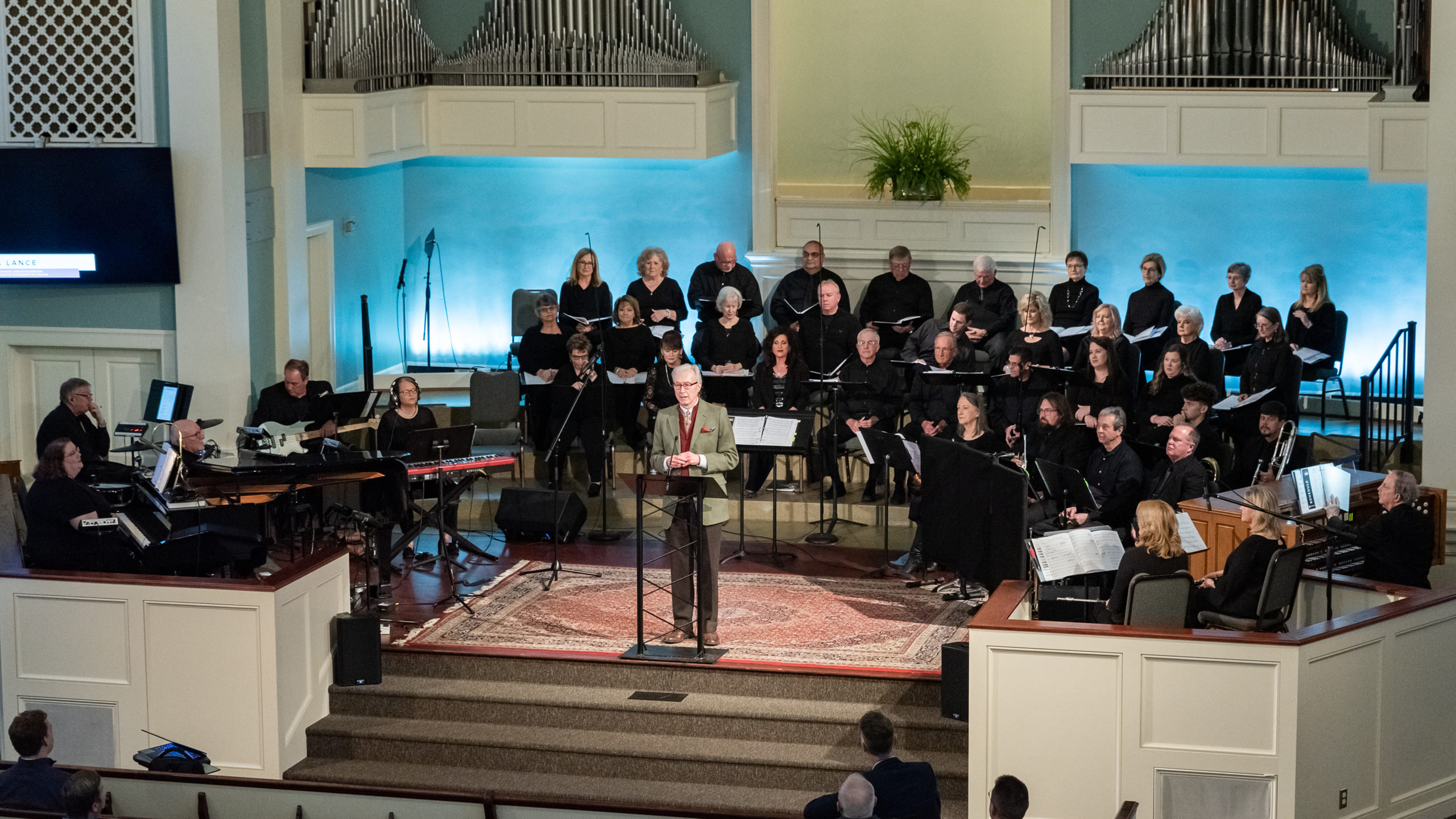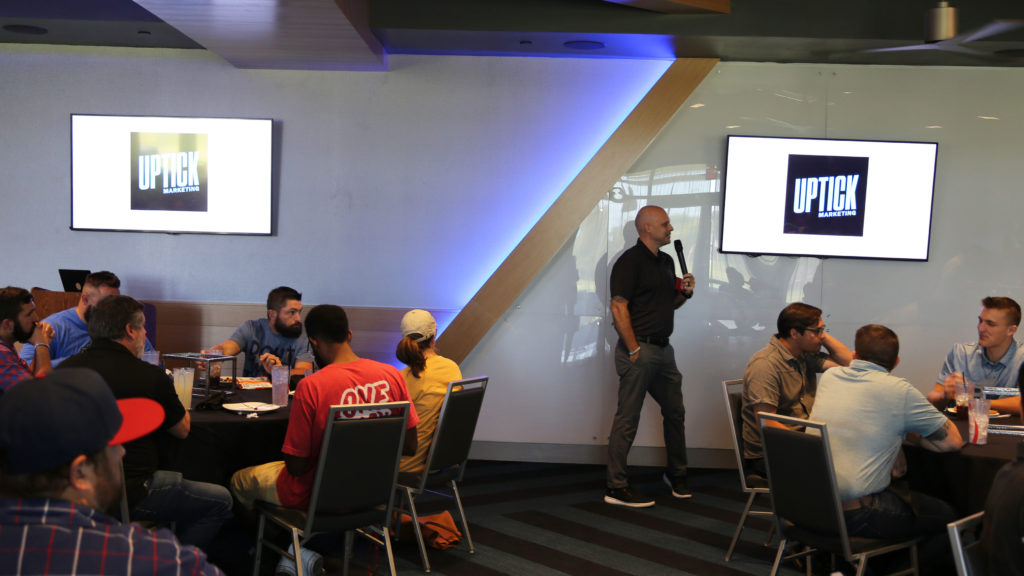Cullman was the last stop on the four-city Sharing Hope Evangelism Conference schedule. The final event, held at First Baptist Church Cullman Mar. 13–14, featured messages from Ed Litton, Ronnie Hill, Tim Beougher and Tom Richter.
Ed Litton
Ed Litton, current Southern Baptist Convention president and senior pastor of Redemption Church in Mobile, spoke to a contemporary challenge facing many churches — members who have simply stopped coming since the pandemic-related pause on in-person church services. He quoted Canadian pastor Carey Nieuwhof: “Many former regular church attenders aren’t mad nor are they afraid. They’re just indifferent to whether they come back to church or not.”
Litton emphasized that the Church in America is in crisis — a credibility crisis. First century Christians had little influence but had power, and Litton said current churches are losing both.
“We are not health-and-wealth preachers but somehow health and wealth has crept into our Baptist churches,” Litton lamented, “so that we are now separated from people that are poor and separated from people that are hurting.”
But pain and suffering can be pathways to sharing the gospel, he said.
“While some may think this disqualifies us,” Litton said, “the word of God says that this qualifies you to preach a gospel to those that are hurting.
“I’m no longer trying to fill my church,” he declared. “I’m trying to fill them with Jesus.
Ronnie Hill
Full-time evangelist Ronnie Hill shared practical tips for evangelism, recalling, “Dr. Roy Fish, former Southwestern Baptist Theological Seminary professor, once told me, ‘Ronnie, you cannot be a good platform evangelist unless you are a personal soul winner.’”
Hill added that no matter how many classes or sermons on evangelism a church provides, attenders won’t evangelize unless the pastor has a lifestyle of sharing the gospel one-on-one.
He encouraged pastors to take advantage of divine encounters and to consistently call people to a decision on salvation.
Though it may not be “trendy” to give invitations after a sermon, Hill said, it could be the only time for someone to give their lives to Christ.
Tim Beougher
Practical ways of engaging others with the gospel was the main emphasis for Tim Beougher, pastor of West Broadway Baptist Church and professor of evangelism and church growth for the Billy Graham School of Missions at Southern Baptist Theological Seminary, both in Louisville, Kentucky.
Calling approaches to evangelism “bridges,” Beougher noted three that are common in SBC churches: Three Circles; the “responsibility bridge — it’s a Christian’s responsibility to tell others about Jesus; and diagnostic questions — the Evangelism Explosion method of asking individuals if, when they die, they know they are going to heaven.
He also discussed both common and unusual ways to start a gospel conversation:
- church bridge — Where do you go to church?
- personal experience — Have you come to know Christ in a personal way or are you still in process?
- intellectual — Is there a specific question or concern hanging you up in your spiritual journey?
- personal opinion —What do you think about God, Jesus Christ, the Bible, religion, the meaning of life, being a true Christian, etc.?
- current issues — Using current topics to start a conversation (a method advocated by Billy Graham, he noted).
- sports — Did you know ______ (name of athlete) is a Christian? (typically better for men)
- felt needs — Identifying a felt need can show how the gospel answers deep needs.
- prayer — How can I pray for you?
- relationships — We’ve been friends for a while now. Could I share with you about my spiritual pilgrimage?
- history — In all of history, who has had the greatest impact on the world?
- tattoo — That’s an interesting tattoo. What’s the story behind it?
- heaven — When a famous person has died, bring up heaven.
- profanity — I’ve heard you mention Jesus Christ’s name three times. Do you know Him?
Tom Richter
Tom Richter, pastor of FBC Cullman, concluded the conference with an unlikely evangelism message based on Genesis 24, an account of Abraham sending a servant to find a wife for his son Isaac.
Richter pondered why this long chapter was worthy of so much space, noting it wasn’t simply how God was faithful in Isaac and Rebekah’s love story or how God was faithful in the love story of the children of Israel.
“Could it be that this chapter was meant to encourage your heart this morning, as you think about the greatest love story ever told — the cosmic love story?” Richter asked.
He noted that God the Father has a name — Yahweh; God the Son has a name — Jesus; but God the Holy Spirit is unnamed, like Abraham’s servant.
“You have an unnamed servant in the Holy Spirit who issues forth from Father and Son to win for the Son a bride,” Richter said. “When the unnamed servant [in Genesis 24] shows up, he doesn’t talk about himself. He said, ‘Let me tell you about my master.’
“Isn’t there still an unnamed servant who issues forth, who brings gifts … to capture for Himself a bride? The Holy Spirit is at work. He’s the servant who is still in the world, still touching hearts,” Richter declared.
For more information on effective ways to share hope visit evangelizeAL.org. Tim Beougher’s book, “Overcoming Walls to Witnessing,” is sold on Amazon.






Share with others: